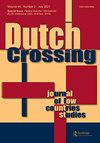Address Choice in Dutch 2: Pragmatic Principles of Address Choice in Dutch
IF 0.4
3区 历史学
Q1 HISTORY
Dutch Crossing-Journal of Low Countries Studies
Pub Date : 2018-09-02
DOI:10.1080/03096564.2015.1136122
引用次数: 3
Abstract
ABSTRACT This paper reports on research into the use of Dutch forms of address (i.e. the second-person pronouns u and je/jij) among two generations in the Netherlands. Its main aim is to determine the factors behind different choices of address pronoun. It takes the model of address choice proposed by Clyne et al. in Language and Human Relations (Cambridge University Press, 2009), and more specifically their concept of general pragmatic principles, as its theoretical inspiration. The research is based on a questionnaire in which respondents were asked which pronoun they used to address a variety of interlocutors. The questionnaire also asked respondents to reflect on their choice, especially if it was ambivalent (i.e. if they would address the same type of interlocutor sometimes with u and sometimes with je/jij). It is the qualitative analysis of these reflections that is the focus of this paper. Although there is some variation between the age groups’ evaluation of the importance of some principles, the article establishes (relative) age and familiarity as the leading principles in Dutch address choice. There is also a high level of meta-sociolinguistic awareness of the mechanisms behind address choice. The conclusion suggests a number of modest enhancements to Clyne et al.’s model of address choice.荷兰语称呼选择2:荷兰语称呼选择的语用原则
摘要本文对荷兰两代人称呼方式(即第二人称代词u和je/jij)的使用情况进行了研究。其主要目的是确定不同称呼代词选择背后的因素。它以克莱恩等人在《语言与人际关系》(剑桥大学出版社,2009)中提出的称呼选择模型,更具体地说,是他们的一般语用原则概念作为理论灵感。这项研究基于一份调查问卷,在问卷中,受访者被问及他们在称呼各种对话者时使用的代词。问卷还要求受访者反思他们的选择,特别是如果选择是矛盾的(即,如果他们有时用u,有时用je/jij来称呼同一类型的对话者)。本文的重点是对这些反思进行定性分析。尽管不同年龄组对某些原则重要性的评价存在一定差异,但本文确定(相对)年龄和熟悉度是荷兰语称呼选择的主要原则。对称呼选择背后的机制也有高度的元社会语言学意识。该结论建议对克莱因等人的称呼选择模型进行一些适度的改进。
本文章由计算机程序翻译,如有差异,请以英文原文为准。
求助全文
约1分钟内获得全文
求助全文

 求助内容:
求助内容: 应助结果提醒方式:
应助结果提醒方式:


